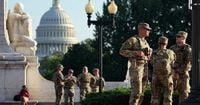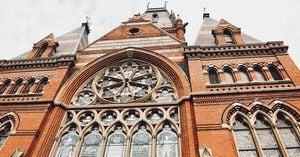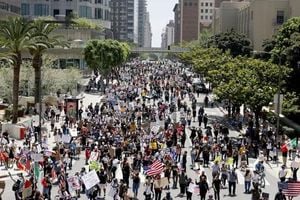In the heart of Washington, DC, a mission unlike any other is unfolding. Since mid-August 2025, more than 2,200 National Guard soldiers have been deployed to the nation’s capital under orders from President Donald Trump, as part of a sweeping crackdown on crime and a push to “beautify” the city. The deployment, which includes roughly 1,300 troops from out of state and over 1,300 from Republican-led states, has quickly become a source of confusion, controversy, and mixed emotions for those on the ground and their families back home, according to extensive reporting by CNN and other outlets.
For many of these soldiers, the daily grind is far from what they expected when they signed up for service. Instead of responding to natural disasters or emergencies—a hallmark of typical National Guard missions—they find themselves patrolling tourist hotspots, walking the city’s streets from 4 p.m. to 4 a.m., and engaging in tasks that some have described as mundane or even demoralizing. One Tennessee Guardsman’s father recounted his son’s surprise: “I don’t know what he thought he’d be doing, but I really don’t think he thought he’d just be walking around for 12 hours every day.” His son, a car salesman by trade, is now making less money while deployed. “When I talked to him, he was just like, ‘Yeah, this is crazy,’” the father told CNN.
Others echo this sense of bewilderment. A soldier from Mississippi confided to a loved one about being repeatedly cursed at while on patrol. Another, from Louisiana, told his wife that confusion about the mission’s true purpose was widespread among the troops. “We haven’t gotten critically low on morale, but we’re falling fast,” one unnamed soldier admitted to CNN, capturing the growing sense of frustration among the ranks.
The duties assigned to these Guardsmen are, in many cases, a far cry from the high-stakes emergencies they’re trained for. Alongside patrols, many have been tasked with “beautification projects”—a euphemism for picking up trash, raking leaves, laying mulch, and even replanting grass. According to a Joint Task Force-DC update, Guardsmen have cleaned more than 3.2 miles of roadways, collected over 500 bags of trash, and disposed of three truckloads of plant waste in coordination with the National Park Service. This work, while important in its own right, has led some to jokingly refer to themselves as “National Gardeners”—a label that, according to retired Army Maj. Gen. Randy Manner, is “very deflating” for soldiers used to more mission-critical assignments.
The deployment carries a hefty price tag—about $1 million a day, CNN reports. That includes $7 million for catered food over the first 10 weeks, $5 million for 18 weeks of laundry services, $5 million for a tent city, $600,000 for air conditioning rentals, and more than $500,000 for land mobile radios. Out-of-town troops are housed in hotels, mostly in suburban Virginia, while DC National Guard members receive housing allowances. For many, the standard military pay falls short of what they’d earn in their civilian jobs, and some have had to scramble to make childcare arrangements back home.
The uncertainty over the mission’s duration only adds to the strain. Military orders for the DC deployment are expected to be extended through the end of December 2025, largely to ensure continuity of benefits like health care coverage, according to senior officials. But as one Guardsman’s wife—pregnant and caring for three children—put it, “I feel like maybe they would get a little boost in morale if they could just get a little bit more details.”
This mission, split between a “safe and secure” contingent supporting law enforcement and a “beautification task force” cleaning up national parks, has had visible effects on the city. According to Joint Task Force-DC, there has been a 37% drop in carjackings, a 50% decrease in robberies, and a 23% drop in violent crime since the National Guard’s arrival. President Trump has seized on these figures, declaring, “We have no crime. You’re not going to be shot.” He’s also claimed credit for making the city safer and has asked Congress for $2 billion to fund further beautification efforts.
Yet, not everyone is convinced the deployment is justified or effective. Violent crime in DC had already declined in 2024 and continued to drop in 2025, according to city officials. The Justice Department is now investigating whether crime data from the DC Metropolitan Police Department may have been manipulated. Trump’s claim that crime was at “emergency levels” has been met with skepticism, especially as city residents have voiced opposition to the military presence. Protesters have chanted “Go home” at troops stationed outside metro stops, and posters calling for their departure have appeared on street corners.
Some families, despite supporting Trump’s decision and the presence of “boots on the ground,” acknowledge the personal sacrifices involved. The mother of a Mississippi soldier lamented that her daughter was missing out on “a lot of first events with her child” due to the deployment. Others, like the father who joked that his son’s assignment was like a vacation, try to find humor in the situation. But for many, the reality is a mix of pride, confusion, and growing fatigue.
Trump has signaled that the DC deployment could be a model for other cities. He’s threatened to mobilize the National Guard to Chicago, Baltimore, and New Orleans, asserting, “Chicago is a mess, you have an incompetent mayor...and we’ll straighten that one out probably next.” He’s also stated that he could keep National Guard members in Washington “as long as I want” by declaring a national emergency.
Within the ranks, reactions from Washingtonians have been mixed. Some locals thank the troops and snap photos with them, while others offer only disapproving glances. On Labor Day weekend, National Guard soldiers stood beside armored vehicles at Union Station as protesters gathered nearby, and others patrolled the city’s baseball stadium during a Nationals game.
Retired Army Maj. Gen. Randy Manner warns that the continued use of the National Guard in this way risks driving a wedge between the military and the American public. “Our military’s duty is to defend our nation overseas and to be there to save lives in times of a natural disaster,” he explained to CNN. “So this idea that the National Guard are there to watch us and to intimidate us, if it is continued over the next months and years, will absolutely drive this feeling that those men and women in uniform are not us, and they are against us.”
As the mission stretches on, the soldiers wait for clarity. One out-of-state Guardsman summed it up simply: he’ll be in Washington “until they tell us we can go home.” For now, the city remains under watchful eyes—some weary, some determined, all caught in a mission that is anything but ordinary.




